英语形容词及副词
高中英语语法—形容词、副词

例题
1) Tony is going camping with ___ boys. A. little two other B. two little other C. two other little D. little other two
答案点拨:C 由"限定词--数词--描绘词--(大小,长短,形状,新 旧,颜色) --性质--名词"的公式可知数词,描绘词,性质依次顺序 只有C符合答案。
2、+ed
excite—excited worry—worried surprise—surprised close—closed interest—interested frighten—frightened
3、+ing
interest—interesting excite—exciting surprise—surprising follow—following
4、+y 所有表示天气状况的的形容词
sun—sunny snow—snowy wind—windy rain-rainy cloud—cloudy health—healthy
5、+ en
wool-woolen wood--wooden
6、+ern (东西南北)
east--eastern south-southern west--western north--northern
多个形容词做定语时的排列顺序:
在不确定的时候,可参照如下口诀: 美小圆旧黄,法国木书房 注释:美——描述性质;小——大小、长短、 高矮胖瘦 旧——新旧、年龄 圆——形状;黄——颜色;法国——产地、 国籍;木——材料;书房——用途 a new red silk cap一顶红色新丝帽 a short young Japanese businessman
小升初英语复习:形容词、副词

(1) “A + be +形容词比较级+ than + B”意思为“A比B更……”。
如:My pen is cheaper thanyours . 我的笔比你的便宜。
Tom runs faster thanyou. 汤姆比你要跑得快。
(2) 进行选择性比较时,可用“which/ who+be+形容词比较级,A or B ?”表示“A和B中,哪一个/ 谁更……..?”。
如:Who is taller (tall), Lucy or Lily? 露西和丽莉谁更高?(3) “比较级 + and + 比较级”或“more and more +原级”表示“越来越……”如:It becomes warmer and warmer when spring comes.春天来了,天气变得越来越暖和了。
(4) “the +比较级……, the+比较级......”,表示“越……越……”如:The more money you make, the more you spend.钱你赚得越多,花得越多。
温馨提示:a bit, a little, much, a lot, still, even 可修饰形容词或者副词的比较级。
Peter is much taller(tall) than Daming. 彼得比大明高得多。
(三) 最高级用法形容词、副词的最高级形式主要用来表示三者或三者以上人或事物的比较,表示“最……”的意思。
句子中有表示范围的词或短语。
如:of the three, in our class等。
结构:(1) Who + be + the + 形容词最高级,A, B or C? 表示“ABC中谁最…..?”Who is the most beautiful (beautiful)girl, Lily, Lucy or Lingling?丽莉、露西和玲玲谁是最漂亮的?(2) Which + be + the + 形容词最高级,A, B or C? 表示“ABC中哪一个最…..?”Which bag is the heaviest(heavy), the yellow one, the red one or the black one?哪个包包最重,黄色的,红色的还是黑色的?(3) A + 谓语 + the + 形容词/副词最高级 + 表示范围的短语(of/ in…) .表示“A在哪一范围内是最…..?”如:He is the tallest (tall) in our class. 他在我们班里是最高的。
英语语法之形容词和副词

形容词和副词一、形容词和副词的作用1.形容词(adj.)修饰名词形容词(adj.)修饰名词时,有两种位置:1紧挨着被修饰的名词,做定语。
例:This is a wonderful world.(形容词wonderful修饰名词world)We are now living in a beautiful new house.(形容词beautiful和new修饰名词house)2置于系动词之后,做表语。
例:Their sleeping bags were warm and comfortable.(形容词warm和comfortable修饰名词sleeping bags)2.副词(adv.)修饰动词、句子、其他的形容词或副词例:Roy acted quickly.(副词quickly修饰动词act)Suddenly,one of the children kicked a ball.(副词suddenly修饰整个句子)It rained continually and it was often bitterly cold.(1.副词continually修饰动词rain;2.副词bitterly修饰形容词cold)The students from elite universities catch up very quickly.(1.副词quickly修饰动词catch up;2.副词very修饰另一个副词quickly)备注:一般情况下,形容词后加“ly”,就变成对应的副词。
例如:happy-happi ly、angry-angri ly、rude-rude ly。
例:生气的男孩生气地喊。
→The angry boy shouted angrily.二、形容词和副词的比较级形容词和副词的比较级分为:1)最高级(最...)2)比较级(更...)3)原级比较(一样...)1.形容词/副词的最高级:the+adj./adv.的最高级(+介词短语,表示比较的范围)“(...范围内)最...”,通常用于三者或以上的比较例:My younger sister is the tallest one in her class.(最高级变化形式:adj./adv.+est)The most serious problem of the project is the lack of power.(最高级变化形式:adj./adv.前加the most)注意:the+adj./adv.的最高级(+in+地点、场所)the+adj./adv.的最高级(+of+比较的对象)例:He is the tallest in our class.He is the tallest of all the students.练习:1)Which is the longest river____the world?2)This is the finest picture____them all.3)This stereo is the most expensive____all the ones in the shop.4)He is the best boxer____our town.答案:in;of;of;in2.形容词/副词的比较级:adj./adv.的比较级(+than+比较的对象)“(和...相比)更...”通常用于两者之间的比较例:I am taller than you.(比较级变化形式:adj./adv.+er)Air tickets are more expensive than train tickets.(比较级变化形式:adj./adv.前加more)Sometimes machines can perform better than human beings.(good比较级的不规则变化:better)注意:比较的对象要一致。
英语形容词和副词

• He had worked hard all his life .(修饰动词) • He is very diligent.(修饰形容词)
• You can find books on that subject quite easily .(修饰副词)
• Luckily she was in when I called .(修饰句 子)
如: • The desk is clean .
3.作宾语补足语,用在cut, find, keep, leave, make, push, tear等动词之 后。如:
• The news made everyone happy.
• 4.与定冠词一起表示某一类人或物, 如: • The rich and the poor live very different
• Surely you don’t think she’s beautiful? • 你一定觉得她不漂亮吧? • 有些时间副词和频度副词也可放在句首,
• 这类词有yesterday, tomorrow, last night,
• finally, at last, now, soon, once, occasionally, • usually, sometimes等。如:
2.作表语,与系动词连用。只作表语,ill, well, content, unable, sorry, glad, mindful, exempt, bound, bent, afraid, ashamed, asleep, awake, away, aware, alike, alive, alert, averse, agape, astir, aflame, afloat, afire.(还有其他以a开头的词)
形容词和副词的知识点归纳英语

形容词和副词的知识点归纳英语一、形容词。
1. 定义与作用。
- 形容词主要用来修饰名词,表示人或事物的性质、状态和特征等。
例如:a beautiful flower(美丽的花朵),“beautiful”描述了“flower”的特征。
2. 形容词的位置。
- 前置修饰:一般放在所修饰的名词之前。
如:a tall boy(一个高个男孩)。
- 后置修饰:- 当修饰不定代词时,形容词后置。
例如:something interesting(有趣的事情)。
- 在一些固定结构中,如“the +形容词”表示一类人时,形容词后置。
例如:the old(老人),the young(年轻人)。
3. 形容词的比较级和最高级。
- 比较级的构成。
- 一般在形容词词尾加 -er。
例如:tall - taller。
- 以e结尾的形容词,直接加 -r。
如:nice - nicer。
- 重读闭音节,双写尾字母再加 -er。
例如:big - bigger。
- 以“辅音字母 + y”结尾的形容词,把y变为i再加 -er。
如:heavy - heavier。
- 不规则变化:good/well - better,bad/badly - worse,many/much - more 等。
- 最高级的构成。
- 一般在形容词词尾加 -est。
例如:tall - tallest。
- 以e结尾的形容词,直接加 -st。
如:nice - nicest。
- 重读闭音节,双写尾字母再加 -est。
例如:big - biggest。
- 以“辅音字母 + y”结尾的形容词,把y变为i再加 -est。
如:heavy - heaviest。
- 不规则变化:good/well - best,bad/badly - worst,many/much - most 等。
- 比较级和最高级的用法。
- 比较级用于两者之间的比较,常用结构有:A+be+形容词比较级+than + B。
中考英语词汇之形容词和副词
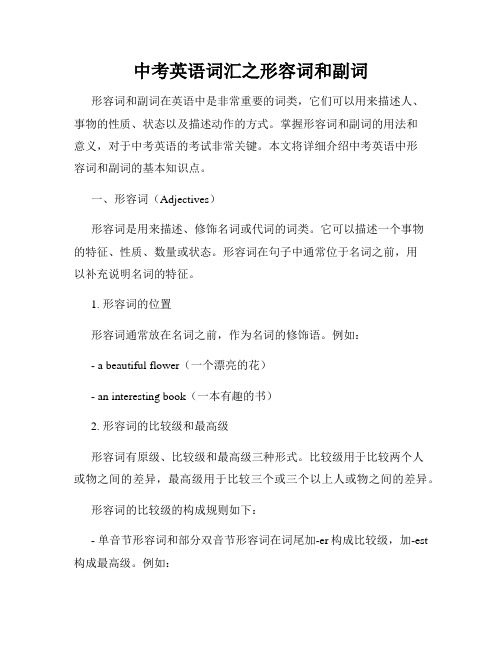
中考英语词汇之形容词和副词形容词和副词在英语中是非常重要的词类,它们可以用来描述人、事物的性质、状态以及描述动作的方式。
掌握形容词和副词的用法和意义,对于中考英语的考试非常关键。
本文将详细介绍中考英语中形容词和副词的基本知识点。
一、形容词(Adjectives)形容词是用来描述、修饰名词或代词的词类。
它可以描述一个事物的特征、性质、数量或状态。
形容词在句子中通常位于名词之前,用以补充说明名词的特征。
1. 形容词的位置形容词通常放在名词之前,作为名词的修饰语。
例如:- a beautiful flower(一个漂亮的花)- an interesting book(一本有趣的书)2. 形容词的比较级和最高级形容词有原级、比较级和最高级三种形式。
比较级用于比较两个人或物之间的差异,最高级用于比较三个或三个以上人或物之间的差异。
形容词的比较级的构成规则如下:- 单音节形容词和部分双音节形容词在词尾加-er构成比较级,加-est 构成最高级。
例如:- small(小的)- smaller(更小的)- smallest(最小的)- tall(高的)- taller(更高的)- tallest(最高的)- 以字母“e”结尾的形容词,在词尾加-r构成比较级,加-st构成最高级。
例如:- brave(勇敢的)- braver(更勇敢的)- bravest(最勇敢的)- 以辅音字母+y结尾的形容词,将y变为i,再加-er构成比较级,加-est构成最高级。
例如:- happy(幸福的)- happier(更幸福的)- happiest(最幸福的)形容词的最高级的构成规则如下:- 单音节和部分双音节形容词在词尾加-est构成最高级。
- 大部分双音节或多音节形容词在前面加most构成最高级。
3. 常见形容词的用法形容词可以用于修饰人物、事物的外貌、特征、品质等。
例如:- beautiful(漂亮的),表示外貌美丽。
例如:a beautiful girl(一个漂亮的女孩)- tall(高的),表示身材高大。
高中英语语法知识:形容词和副词
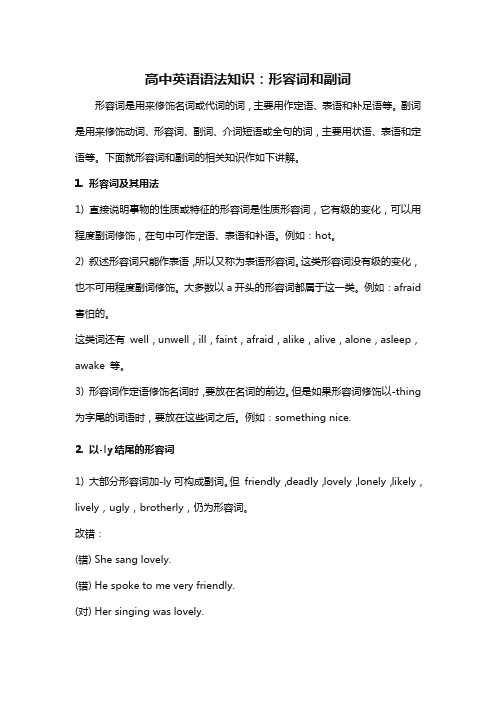
高中英语语法知识:形容词和副词形容词是用来修饰名词或代词的词,主要用作定语、表语和补足语等。
副词是用来修饰动词、形容词、副词、介词短语或全句的词,主要用状语、表语和定语等。
下面就形容词和副词的相关知识作如下讲解。
1. 形容词及其用法1) 直接说明事物的性质或特征的形容词是性质形容词,它有级的变化,可以用程度副词修饰,在句中可作定语、表语和补语。
例如:hot。
2) 叙述形容词只能作表语,所以又称为表语形容词。
这类形容词没有级的变化,也不可用程度副词修饰。
大多数以a开头的形容词都属于这一类。
例如:afraid 害怕的。
这类词还有well,unwell,ill,faint,afraid,alike,alive,alone,asleep,awake 等。
3) 形容词作定语修饰名词时,要放在名词的前边。
但是如果形容词修饰以-thing 为字尾的词语时,要放在这些词之后。
例如:something nice.2. 以-ly结尾的形容词1) 大部分形容词加-ly可构成副词。
但friendly,deadly,lovely,lonely,likely,lively,ugly,brotherly,仍为形容词。
改错:(错) She sang lovely.(错) He spoke to me very friendly.(对) Her singing was lovely.(对) He spoke to me in a very friendly way.2) 有些以-ly 结尾既为形容词,也为副词,如daily,weekly,monthly,yearly,early等。
例如:The Times is a weekly paper. 《时代周刊》为周刊。
The Times is published weekly. 《时代周刊》每周发行一期。
3. 用形容词表示类别和整体1) 某些形容词加上定冠词可以泛指一类人,与谓语动词的复数连接,如the dead,the living,the rich,the poor,the blind,the hungry等。
高考英语形容词和副词
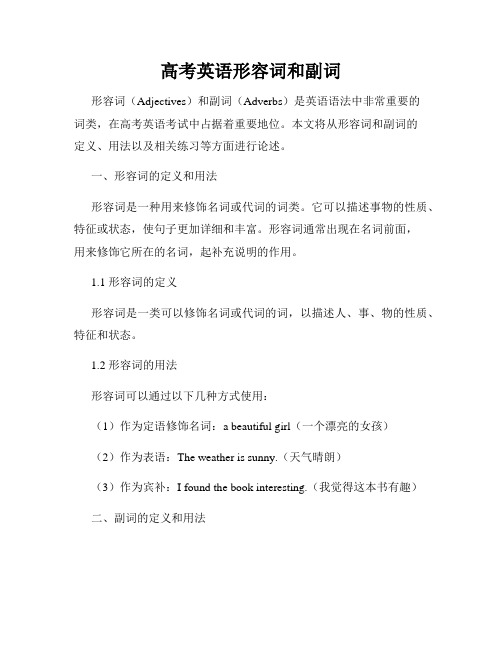
高考英语形容词和副词形容词(Adjectives)和副词(Adverbs)是英语语法中非常重要的词类,在高考英语考试中占据着重要地位。
本文将从形容词和副词的定义、用法以及相关练习等方面进行论述。
一、形容词的定义和用法形容词是一种用来修饰名词或代词的词类。
它可以描述事物的性质、特征或状态,使句子更加详细和丰富。
形容词通常出现在名词前面,用来修饰它所在的名词,起补充说明的作用。
1.1 形容词的定义形容词是一类可以修饰名词或代词的词,以描述人、事、物的性质、特征和状态。
1.2 形容词的用法形容词可以通过以下几种方式使用:(1)作为定语修饰名词:a beautiful girl(一个漂亮的女孩)(2)作为表语:The weather is sunny.(天气晴朗)(3)作为宾补:I found the book interesting.(我觉得这本书有趣)二、副词的定义和用法副词是一种修饰动词、形容词、副词等的词类,用来说明行为或状态的方式、程度、频率、原因等。
副词可以增加句子的信息量,使句子更加准确和精确。
2.1 副词的定义副词是一类修饰动词、形容词或其他副词的词,用以表达行为或状态的方式、程度或其他相关信息。
2.2 副词的用法副词可以通过以下几种方式使用:(1)修饰动词:He runs quickly.(他跑得快)(2)修饰形容词:She is extremely beautiful.(她非常漂亮)(3)修饰副词:He reads very carefully.(他读书很认真)三、形容词和副词的比较级和最高级形容词和副词在表示比较程度时,可使用比较级和最高级。
比较级用于两者之间进行比较,最高级用于多者之中的极端比较。
3.1 形容词和副词的比较级和最高级形式(1)一般情况下,添加-er表示比较级,添加-est表示最高级。
如:fast → faster → fastest(2)以不发音的e结尾的词,直接加-r表示比较级,加-st表示最高级。
英语形容词和副词归纳总结

英语形容词和副词归纳总结英语中的形容词和副词是用来描述名词、动词或其他形容词的词语。
它们在句子中起到修饰和限定的作用,使得表达更加准确和生动。
本文将对英语形容词和副词进行归纳总结,以帮助读者更好地理解和运用这些词语。
一、形容词(Adjectives)形容词用于描述名词,用来说明名词的性质、状态、特征等。
形容词可以直接修饰名词,也可以通过系动词(如am, is, are, feel等)与名词构成系表结构。
形容词通常放在名词前面,用来修饰名词并提供更多信息。
1. 基本形容词基本形容词是最常见的一种形容词,它们用来描述事物的性质和特征。
比如:beautiful(美丽的)、happy(快乐的)、big(大的)等。
2. 比较级形容词比较级形容词表示比较程度,用于将两个或多个事物进行比较。
常见的比较级形容词有:bigger(更大的)、happier(更快乐的)、more beautiful(更美丽的)等。
3. 最高级形容词最高级形容词表示某一事物在数量或质量上达到最高程度。
常见的最高级形容词有:the biggest(最大的)、the happiest(最快乐的)、the most beautiful(最美丽的)等。
二、副词(Adverbs)副词用于修饰动词、形容词、副词或整个句子,用来说明一种动作的方式、程度、时间、频率等。
副词的作用是使句子更加准确和详细。
1. 基本副词基本副词是最常见的一类副词,它们一般以-ly结尾,并用来修饰动词或形容词。
例如:quickly(快速地)、happily(快乐地)、carefully (小心地)等。
2. 程度副词程度副词用来表示动作或状态的强度或程度。
常见的程度副词有:very(非常)、too(过于)、extremely(极其)等。
3. 时间副词时间副词用来描述动作发生的时间或频率。
常见的时间副词有:often(经常)、always(总是)、sometimes(有时候)等。
小学英语语法之形容词和副词
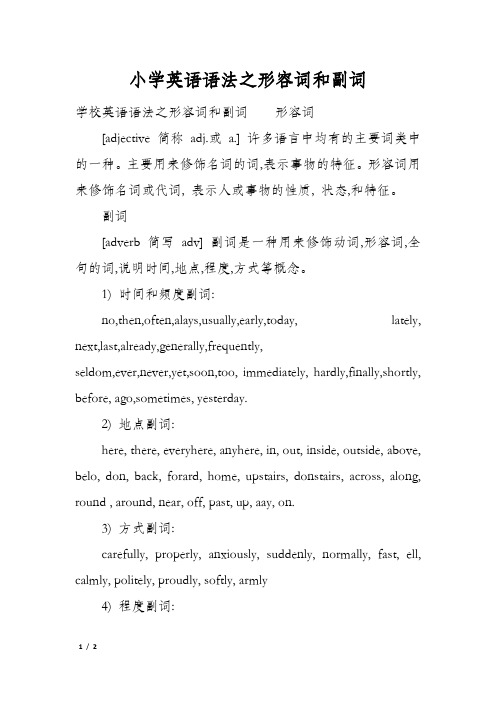
小学英语语法之形容词和副词学校英语语法之形容词和副词形容词[adjective 简称adj.或a.] 许多语言中均有的主要词类中的一种。
主要用来修饰名词的词,表示事物的特征。
形容词用来修饰名词或代词, 表示人或事物的性质, 状态,和特征。
副词[adverb简写adv] 副词是一种用来修饰动词,形容词,全句的词,说明时间,地点,程度,方式等概念。
1) 时间和频度副词:no,then,often,alays,usually,early,today, lately, next,last,already,generally,frequently,seldom,ever,never,yet,soon,too, immediately, hardly,finally,shortly, before, ago,sometimes, yesterday.2) 地点副词:here, there, everyhere, anyhere, in, out, inside, outside, above, belo, don, back, forard, home, upstairs, donstairs, across, along, round , around, near, off, past, up, aay, on.3) 方式副词:carefully, properly, anxiously, suddenly, normally, fast, ell, calmly, politely, proudly, softly, armly4) 程度副词:much,little, very,rather,so,too,still, quite, perfectly, enough, extremely, entirely,almost, slightly.5) 疑问副词:ho, hen, here, hy.6) 关系副词:hen, here, hy.7) 连接副词:therefore,moreover,hoever,otherise,then.。
英语形容词和副词
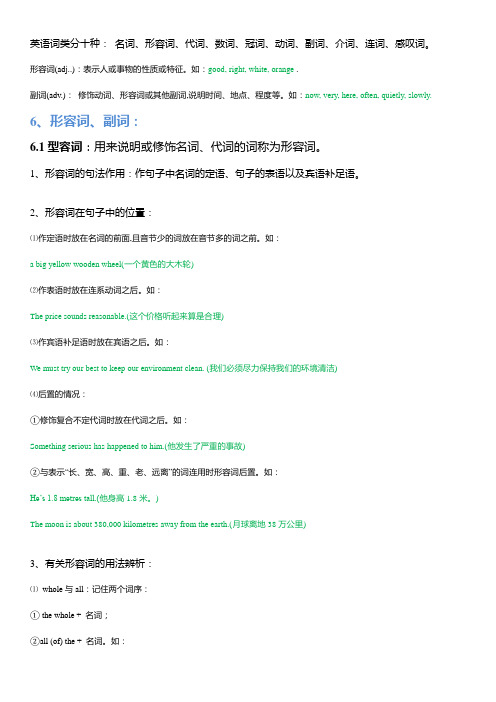
英语词类分十种:名词、形容词、代词、数词、冠词、动词、副词、介词、连词、感叹词。
形容词(adj..):表示人或事物的性质或特征。
如:good, right, white, orange .副词(adv.):修饰动词、形容词或其他副词,说明时间、地点、程度等。
如:now, very, here, often, quietly, slowly.6、形容词、副词:6.1型容词:用来说明或修饰名词、代词的词称为形容词。
1、形容词的句法作用:作句子中名词的定语、句子的表语以及宾语补足语。
2、形容词在句子中的位置:⑴作定语时放在名词的前面,且音节少的词放在音节多的词之前。
如:a big yellow wooden wheel(一个黄色的大木轮)⑵作表语时放在连系动词之后。
如:The price sounds reasonable.(这个价格听起来算是合理)⑶作宾语补足语时放在宾语之后。
如:We must try our best to keep our environment clean. (我们必须尽力保持我们的环境清洁)⑷后置的情况:①修饰复合不定代词时放在代词之后。
如:Something serious has happened to him.(他发生了严重的事故)②与表示―长、宽、高、重、老、远离‖的词连用时形容词后置。
如:He‘s 1.8 metres tall.(他身高1.8米。
)The moon is about 380,000 kilometres away from the earth.(月球离地38万公里)3、有关形容词的用法辨析:⑴whole与all:记住两个词序:① the whole + 名词;②all (of) the + 名词。
如:He was busy the whole morning.(整个早晨他都很忙)He can remember all the words he learns.(他能记住学过的所有单词)⑵tall与high, short与low:指人的个子时用tall与short;指其他事物时一般用high与low。
英语语法——形容词与副词

1)本身就是副词,如 now 现在,there 那里,rather 颇。 2)由形容词加词尾-1y 变来,如 firmly 坚决地,happi1y 幸福地。 3)与形容词同形 early adj. 早的 early adv. 早 high adj. 高的 high adv. 高高地 long adj. 长的,长久的 long adv. 长久地
[注一] 汉语可以说"昆明的气候比兰州好"。英语必须加 that,译为:
The climate of Kunming is better than that of Lanzhou.
[注二]英语比较级常译作"较…"、"…一些"等,但不等于汉语的"更…"。汉语的"更…"须用
"still"或"even"来表示如: This book is even more difficult than that one.这本书比那本书更难。
[注三] 有些形容词一般没有比较等级。如:
right, wrong,woolen,wooden. 不规则变化 原级 比较级 最高级 good 好 we11 好,健康的 better best bad 坏,差 worse worst many 多 more most much 多 little 小,少 1ess 1east far 远 farther,further farthest,furthest 形容词前如加 1ess 和 least,则表示"较不"和"最不"。如: interesting 有趣 difficult 难 less interesting 较无趣 less difficult 较不难 least interesting 最无趣 leas difficult 最不难
英语中的形容词和副词有什么区别

英语中的形容词和副词有什么区别英语中的形容词和副词是两种不同的词性,它们在句子中的作用以及用法上有着明显的区别。
形容词用来修饰名词或代词,描述它们的特征和性质,而副词则用来修饰动词、形容词、副词或整个句子,对其进行补充和修饰。
下面将详细探讨英语中形容词和副词的区别。
一、形容词形容词是一种词性,它通常用来描述名词或代词的性质、状态、特征等,起到修饰的作用。
形容词一般可以放在名词前面作为描述性的修饰语,也可以放在be动词后面作为表语。
形容词通常有以下几个特点:1. 形容词通常有比较级和最高级的形式,用来进行比较和强调。
例如:- This book is more interesting than that one.(这本书比那本书更有趣。
)- She is the kindest person I have ever met.(她是我见过的最善良的人。
)2. 形容词可以通过加上前缀或后缀来构成其他形式。
例如:- beautiful (形容词) → beautifully (副词) → beauty (名词)3. 形容词表达的是名词的特征或性质,用来描述事物的外观、大小、颜色、性质等。
例如:- The blue sky is beautiful.(蓝天很美。
)二、副词副词也是一种词性,它主要用来修饰动词、形容词、副词或整个句子,起到修饰、限定或补充的作用。
副词常常用来回答关于动词的疑问,例如“怎样?在什么时候?在哪里?多久?”等等。
副词通常有以下几个特点:1. 副词没有比较级和最高级的形式,修饰词本身没有大小、程度的差别。
例如:- He runs fast. (运动得很快。
)- She speaks softly. (她说话轻声细语。
)2. 副词可以通过在形容词后面加上-ly来构成,表示方式、程度、时间、地点等。
例如:- quick (形容词) → quickly (副词)- loud (形容词) → loudly (副词)3. 副词通常修饰动词,强调动作的方式、频率、程度等。
英语语法之形容词副词

英语语法之形容词、副词一、定义:形容词是用来修饰和形容名词,说明人与事物性质和特征的词。
副词是用来修饰动词、形容词、副词或整个句子。
二、比较级和最高级的构成方法:1.单音节词和少数双音节词比较级和最高级的规则变化:2. 其他双音节词或多音节词,在该词前面加-more/mostbeautiful—more beautiful—(the) most beautiful3. 由形容词加ly构成的双音节词和多音节词,都是在该词前加-more/most.quickly—more quickly—(the) most quicklydifficultly—more difficultly—(the) most difficultly4. 不规则变化:不规则变化记忆口诀:特殊形式比较级,共有三对二合一。
病坏两多并两好,little意少不是小。
一分为二也三个,距离老远常迟到。
三、形容词比较级和最高级的用法:1. 原级的用法:用于两者之间对比,意思为“……和……相同”A+v.+as….+形容词原级+as BTom is as honest as Jack.2.比较级的用法:①A+形容词比较级+than+ BBeijing is more beautiful than Tianjin.形容词比较级前还可以用much, even, still, a little,far, a lot, a bit, much more来修饰,very, so, too, quite 不能修饰比较级。
②数字+形容词比较级+thanI’m two years older than you.She is a head taller than me.③比较级+and+比较级,表示“越来越……”The earth is getting warmer and warmer.China becomes more and more stronger.④the +比较级,the +比较级结构,表示“越……就越……”The more I study it, the more I like it.⑤which/who +is +比较级Which city is bigger, Beijing or Tianjin?Who is happier, you or me?3. 最高级用法:用于三者及以上的人或事物的比较,最高级前加the,后面跟带in或of表范围的短语。
英语形容词、副词及用法

比较级和最高级的构成
4. 少数以y, er, ow, ble,ple 结尾的双音节词,末尾加er 和est(以y结尾的词,如y前是辅音字母,把y变成i,再加 er和est,以e结尾的词仍只加r和st)
More/most beautiful
比较级和最高级的不规则变化形式
特殊 good/well bad/badly many/much
little
old
far
比较级 better worse more
less older(年龄)老
elder(年长) farther(距离远) further(深造)
最高级 best worst most least oldest eldest farthest furthest
这个房间是那个房间的3倍大。 This room is 3 times as big as that one . This room is 3 times the size of that one. This room is twice bigger than that one .
四 形容词、副词
目 录
01 adj.的作用 02 adv.的分类 03 adv.的作用 04 adj.\adv.等级的构成及运用 05 adj.\adv.的辨析
Warm up
形容词:用来描写、修饰名词或代词,表示人或事物的性 质、状态和特征。 副词:修饰动词、形容词、其他副词、介词短语或全句等, 表示时间、点
angr y(生气的) -angrier-angriest clever (聪明的)-cleverer- cleverest narrow(狭窄的) -narrower-norrowest able(能够) -abler- ablest simple(简单的) -simpler-simplest 5. 其他双音节和多音节词都在前面加单词more和most different wonderful beautiful
- 1、下载文档前请自行甄别文档内容的完整性,平台不提供额外的编辑、内容补充、找答案等附加服务。
- 2、"仅部分预览"的文档,不可在线预览部分如存在完整性等问题,可反馈申请退款(可完整预览的文档不适用该条件!)。
- 3、如文档侵犯您的权益,请联系客服反馈,我们会尽快为您处理(人工客服工作时间:9:00-18:30)。
英语形容词及副词
B. 形容词的构成
1.名词+ y变为形容词 n + y: rainy, sunny foggy stormy, windy, snowy, frosty, cloudy, lucky, healthy, sleepy, noisy, guilty…
英语形容词及副词
否定 not as+形容词原形+as “和… 不一样”
或 not so+形容词原形+as “不及/不如…
Tom is not as tall as Mike.
Tom is not so tall as Mike.
英语形容词及副词
比较级+than…
Our school is larger than theirs. This bridge is longer than that one.
英语形容词及副词
“The+比较级…,the+比较级…” The smaller the house is, the less
it will cost us the heat.
“…比较级+and+比较级…”
In spring, the days are getting longer and longer.
best
worse
worst
more
most
less
least
farther/further farthest/furthest older/elder oldest/eldest
英语形容词及副词
as+形容词原形+as Tom is as tall as Mike. Tom is three times as old as Mike. There are as many students in our sc3;that丛句
He is so big that he can’t enter the room by the door . … too+原级+ to do sth. He is too young to join the army. 形容词原级+ enough to do sth. This truck is big enough to carry 5 tons.
He made us happy.
Colour it green.
英语形容词及副词
英语形容词及副词
taller hartdaellrest hardest
larbfgaiegttrgewerbhwhriowiegdlahtategteptoreteerpgttssestieteetrtsfrstattwteisdtest hapdpriieersdt reiaerliest earlier
2.名词+ ly变为形容词 n + ly: lovely, friendly, lonely, lively weekly, daily…
3.名词+ 其它后缀变为形容词: n+ ful: careful, beautiful… n+ less: careless, useless… n+ ous: dangerous…
英语形容词及副词
The trees turn green in spring. We are alone on the island. 只能作表语,不能作定语的形容词 你能说出几个?
alone afraid awake asleep alive able
英语形容词及副词
形容词和宾语一起构成复合 宾语.e.g. We must keep the classroom clean.
少数以-er,-ow结尾的双音节 词可加-er或-est
narrowest mnaorsrot wdcilefefrviceureltst mmoorreemmcdpleooiofvsspfiettucrpsulealolrortpwullyar more slowly
英语形容词及副词
better
英语形容词及副词
We can add prefixes to some adjectives to form
opposites.
1.He lookedu_n_h_a_p_p_y__ because he didn’t pass the exam.
(happy)
2.It is i_m__p_o_li_t_e_ to shout at the old people. (polite)
形容词及副词
英语形容词及副词
用以修饰名词,表示事物的特征 的词。e.g. long, empty, cheap, hungry, etc. 在句中作定语、表语、宾语 补足语等成分.
英语形容词及副词
e.g. He is a good student. I have something important to tell you. 当形容词修饰由some-,any-,no-,every构成的不定代词时,形容词要放在这些 不定代词的之后. e.g. Is there anything interesting in today’s newspaper ?
Can you change the flowing words into opposites?
英语形容词及副词
表示两者之间的选择,可使用 “Which is+ 比较级,…or…?”
Which is longer, this one or that? 表示不及另一方时,使用“less+原级 +than…” This park is less beautiful than that one.
英语形容词及副词
英语形容词及副词
…one of the+最高级+名词复数 Lu Xun is one of the greatest writers last century.
…最高级+of (in)…
Of all the movie stars, I think Zhang Ziyi is the best. This is/ was the最高级+名词+that定语从句
